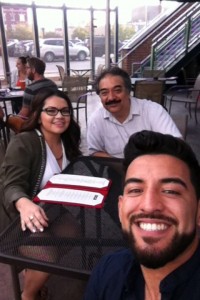
Jose Lopez, LULAC of IL State Director, myself and Jesus Payan chatting about improving community outreach via social media and unified webpage for LULAC of IL.
Narratives and storytelling has been a long standing tradition in the Latina/o community. It is often in that way in which we learn; by hearing stories from the elders in our families or communities telling us of our long standing traditions from our ancestors before us, events that have occurred when the thought of us was not even conceived, still in our mother’s womb or too young to remember. I grew up with story telling and learned the importance of narratives. To my family and to our community, narratives gave a platform to the unheard. But throughout the existence of our community, we have been shamed and conditioned into believing that we should not speak up for what we believe in due to fear or retaliation of what the majority in the United States could do to us. I’ve slowly seen this fear stripped away by the courageous acts of many in the Latin@ community in the U.S. From Cesar Chavez and Dolores Huerta forming the United Farm Workers in California to protest the working conditions of the fruit and vegetable pickers in the fields, to young immigrants proclaiming that they are undocumented and unafraid and recently, to the undocumented trans activist Jennicet Gutierrez interrupting President Obama during a pride event at the White House, crying out: “President Obama, release all LGBTQ immigrants from detention and stop all deportations”, the Latin@ community has had enough. Even in the most difficult of times, I don’t believe we have ever been quiet. We simply have never been heard. And now, finally, people are listening.
Having the opportunity to attend the 86th Annual LULAC National Convention in Salt Lake City in early July, reminds me of the several facets of racism, discrimination, prejudice and systematic inequality my community has faced and continues to face to this day. It is always empowering for me to go into a room full of Latin@s that are fighting everyday, across the country, to help dispel the injustices that are occurring. It is in these spaces that we are allowed to come together, meet new people, formulate new strategies and ideas for the betterment of community at a local or national level.
Often times, in social justice work, it can feel lonely or that no matter what you do or how hard you work, it’s never going to end and it’s never going to be enough. During these times, I am reminded of a saying my mom always tells me: todo tiene solucion, menos la muerte. Everything has a solution, except for death. While at times, the work I am doing may seem insignificant to some or not enough, I know that I, along with so many other’s, are doing what we can with what we have. Attending the LULAC National Convention was a thrilling reminder for me that the work that I am doing in my community does matter. Although some days are not easy, better days will come. There’s a long road ahead and so much work to be done. It’s scary to think of what lays ahead, but I am ready to do whatever it takes to create a more just community for my people and our future generations.